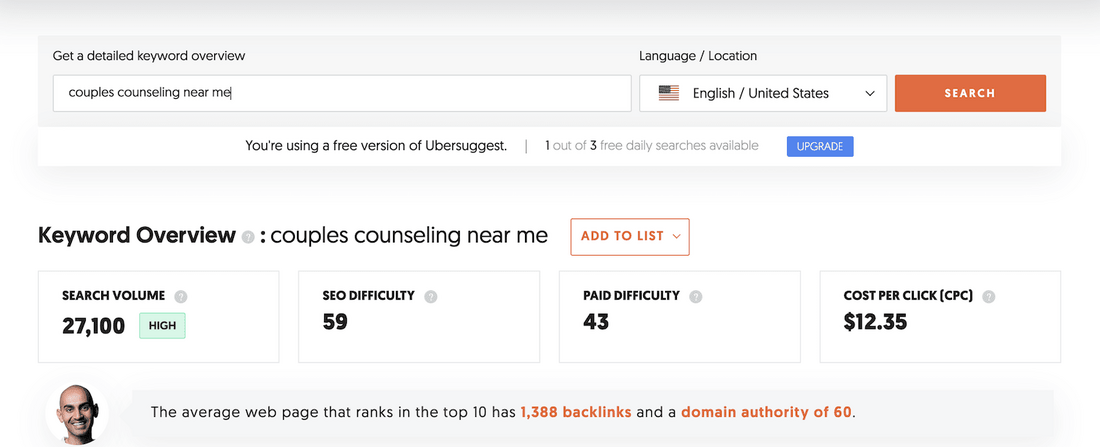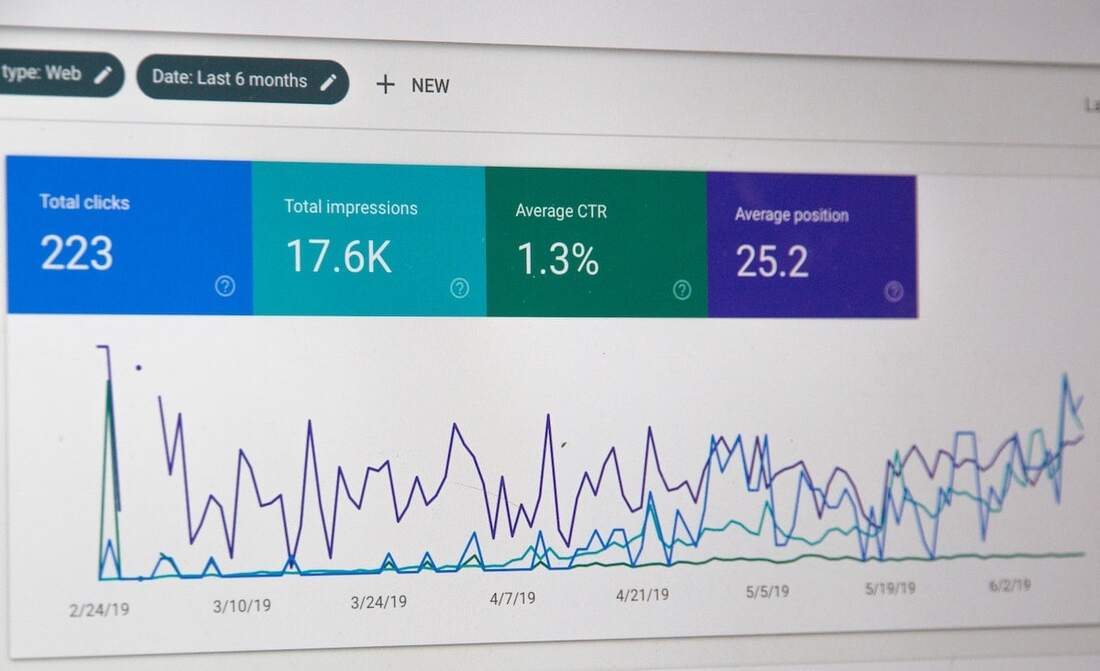
Therapists are often skilled at developing connections with people, but what about connecting with potential clients? If you're trying to expand the reach and visibility of your practice, few tools are more powerful than the internet. To ensure you're making the most of this invaluable resource, it's important to first understand the basics of search engine optimization, also known as “SEO”.
The web can be an overwhelming place, incomprehensibly vast and saturated with content. In order to navigate the chaos, most people rely on search engines like Google and Bing to impose order. To do this, search engines continuously crawl the internet, catalog all accessible content, and rank it according to its perceived value and relevance. The highest-ranking links are returned first, making them more visible to users and driving more traffic to those sites.
While search engines rank pages using highly sophisticated algorithms, the results largely depend on a few key variables. Search engine optimization, or SEO, is simply the process of optimizing these components to improve your website's ranking. When a potential client performs a relevant web search, well-executed SEO ensures that your website is among the first served up by the search engine. This significantly increases your practice's visibility and can even help establish credibility and authority.
While comprehensive SEO is often best handled by a professional, there are some basic techniques a private practitioner can take advantage of to give your practice a better chance at ranking in the SERPs (search engine results pages). In this guide, we will outline the essentials of SEO to provide a roadmap for generating client leads without having to pay for them through paid Google or social media ads.
If you were to peer under the hood of Google's search engine, you'd find a dizzying array of factors that affect the rankings of search results. To avoid businesses gaming their system, Google doesn't often advertise the technical components of their search algorithm, however, it is thought to contain over 200 factors with hundreds of changes or updates to the algorithm occurring each year. Despite this technical complexity, however, the essence of effective SEO is simply understanding what people are searching for and how search engines help them find it. To answer these fundamental questions, search engine optimization can be divided into three core components.

If you don't understand what your prospective clients are searching for, how can you ever hope to reach them effectively? That's where keyword research comes in. Keywords are the specific words and phrases that people use in their search queries (e.g. when they Google something). By studying the keywords your prospective clients are using, you can gain a much better understanding of the kind of content they're seeking.
Diligent keyword research can provide a treasure trove of valuable information. In addition to learning which terms are most popular, you can identify less competitive keywords, gain insights into the needs and priorities of prospective clients and even find growing niches that aren't being served. All of this data is extremely useful in crafting content that effectively targets the audience you're trying to reach.
Keyword research can be a very complicated topic with many books and courses dedicated to the topic. But at its simplest, keyword research comes down to 2 ideas: (1) Search Volume and (2) Keyword Difficulty.
Search Volume is simply how often a keyword gets searched each month. Ideally, you can get your website to rank high for keywords that get a lot of search volume, which would drive a lot of traffic to your website. But this is where keyword difficulty comes in.
Keyword difficulty is how hard it is to get your website to rank high in Google for a specific keyword. Keywords with high search volume are often very hard to rank for in Google (aka a high keyword difficulty). Why? Because lots of other websites also want to rank for those types of keywords. So the keywords become very competitive, with the most authoritative websites often ranking the highest in Google.
One of the main goals of keyword research is finding valuable keywords that your website can rank for. You can use the tools recommended below to get started researching potential keywords. Here is a list of keywords that you can start with:
For many of these keywords, you can also add location modifiers to them. For example, the keyword “couples counseling” can become “couples counseling near me” and “couples counseling in Minneapolis” (you switch it to a city near you).
This is just an initial keyword list to help you get started. Get creative and add keywords around your specialties (e.g. marriage therapy, Christian couples counseling, etc.) or around topics that you think your prospective clients may search for. The great thing about building out a comprehensive and accurate keyword list to use for your business is that you can also use many terms from the same list in paid advertising such as Google Ads or for generating ideas for topics you can blog about.

While keyword research helps you better define and understand your audience, it's on-page SEO that allows you to put this knowledge into practice. This broad category includes everything from the layout and content of your website to the HTML code underlying each page. Although on-page SEO can get rather complex, there are a few simple rules that are worth keeping in mind.
The best place to start is doing a technical website audit to see how your website is performing right now. Circulation Studio, a digital marketing agency that the NRMFT registry works with and recommends, is offering a free website audit to help you get a better understanding of your current website’s SEO health. You’ll get a breakdown of what your site is doing well, what is wrong with your site, and how to improve it. Just enter your email and the location of your office and you’ll get a free technical audit sent to your email.

The final key component of search engine optimization is all about perception. More specifically, it's about ensuring that your website is viewed as a valid and trusted source. To establish this all-important credibility on the web, you need to start building backlinks.
Also known as inbound links, backlinks are simply links on other websites that lead to one of the pages on your website. Each backlink essentially serves as a vote of confidence to search engines like Google. But not all votes are created equal. The value of the vote depends on the quality of the website from which the link originated. The more backlinks you have from authoritative websites, the more credible your own website appears to search engines.
There are many ways to get backlinks to your website, but the most common ways, especially for therapists, are: (1) Creating quality content and (2) Creating profiles on social media & therapist directories
The simplest way to earn these reputation-enhancing links is to produce quality content or unique resources that people are eager to share. Engaging with others and building relationships, either online or in your local community, can also be a great way to earn more backlinks. Finally, don't be afraid to reach out to established websites if you have something valuable to offer.
While writing content is a great way to get backlinks, it can also require a lot of time investment. A great first step for immediately getting quality backlinks to your website is creating social media profiles and joining key therapist directories like NRMFT.
Therapists directories offer many benefits, a benefit that is often overlooked is the backlink you get from their website. Many therapist directories are highly authoritative websites, meaning your website will become more credible in Google’s eyes when you get links from those sites. So when you fill out your profile on those directories, make sure you include a link to your own website.
Join NRMFT today with a 1-month free trial with the code “FREETRIAL”
The best way to improve your SEO skills is to jump in and start practicing. Even if you're an online marketing neophyte, implementing a few basic tweaks can improve your search rankings and bring in more prospective clients. To give yourself the best chance for success, be sure to steer clear of these common SEO mistakes.
The quickest way to torpedo your SEO efforts is to make assumptions about your target audience. If you haven't done proper research to identify specific keywords and strategies, you're setting yourself up for failure. Your research should guide everything you do, from the content you write to the way you format your website.
It may seem trivial, but using HTML tags properly is crucial to attracting more traffic. In addition to helping search engines identify relevant content, unique title and meta description tags allow you to control how your website is displayed in search results.
While incorporating keywords is certainly important, stuffing them all over the place can do more harm than good. For best results, remember to practice a little restraint. Choose a few high-priority keywords and include them only where they fit naturally within your content.
No matter how good your content may be, it won't matter if people never see it. If your site is slow to load or difficult to navigate, you may end up driving away potential clients. Many people also prefer to browse the web on their phones, so make sure your site is designed to display properly on mobile devices.
When it comes to SEO, quality is almost always more important than quantity. Whether you're creating content for your website or building backlinks, it's best to take your time and focus on doing things the right way.
It's easy to feel overwhelmed by search engine optimization, but you don't have to be a trained professional to see positive results. By ensuring your website adheres to these simple fundamentals, you can expand your online presence and turn more search traffic into more clients for your practice.
